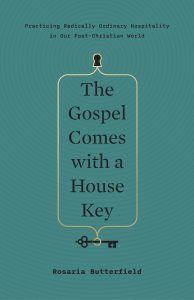I always like to know a little something about an author before I sit down and open up his or her book. Today, I’m thrilled to share an interview with Rosaria Butterfield about her new book, The Gospel Comes with a House Key: Practicing Radically Ordinary Hospitality in Our Post-Christian World. As most of us have experienced, it’s easier than ever to live in communities with no sense of community. Neighbors don’t know neighbors and too often our lives are lived online rather than on the front porch. In The Gospel Comes with a House Key, Rosaria demonstrates how living a life of radical ordinary hospitality can allow strangers to become neighbors and, by God’s power, those neighbors can become part of God’s family. I couldn’t put this book down—it’s compelling, challenging, and convicting.
Can you tell us a little bit about yourself?
 I was raised in a Chicago suburb in an Italian Catholic home. I attended predominantly Catholic schools, and I am named after the rosary. (I like to think of my first name as a useful icebreaker for a Reformed Presbyterian pastor’s wife.) After my conversion to Christ at the age of 36, which I wrote about in The Secret Thoughts of an Unlikely Convert: An English Professor’s Journey into Christian Faith, I lost everything but the dog. One of God’s greatest blessings to me is my husband, Kent Butterfield, pastor of the First Reformed Presbyterian Church of Durham (North Carolina), our children, our church, and our extensive, joyful, and diverse family of God.
I was raised in a Chicago suburb in an Italian Catholic home. I attended predominantly Catholic schools, and I am named after the rosary. (I like to think of my first name as a useful icebreaker for a Reformed Presbyterian pastor’s wife.) After my conversion to Christ at the age of 36, which I wrote about in The Secret Thoughts of an Unlikely Convert: An English Professor’s Journey into Christian Faith, I lost everything but the dog. One of God’s greatest blessings to me is my husband, Kent Butterfield, pastor of the First Reformed Presbyterian Church of Durham (North Carolina), our children, our church, and our extensive, joyful, and diverse family of God.
When did you first start writing? What do you enjoy about it?
I first started writing as a child, trying to make sense of the anger, unpredictability, and drug and alcohol abuse in my home. Writing forces me to hold on to some things and to say goodbye to others. Writing is my filter for memory. Writing helps me craft beauty out of pain.
The kind of writing that I do is this: book writing, combining memoir with applied theology.
I also enjoy personal correspondence (of the hand-written vintage) and book reviewing. I don’t have a blog, and I don’t have a social media presence for a reason: I don’t trust myself with any writing medium that values rash impulsivity.
I read more than I write. My usual book chapter ratio is 25:1—25 books read for every one chapter written. I am an avid re-reader of good books, so this number includes many more “re-reads” than first reads.
Is writing ever difficult for you? How so?
Book writing is consuming for me and is very difficult—both for me and on those around me. I write books between 4 and 6 a.m., and like other writers who work in the dark of early morning, my writing tends to come out raw and unfiltered and frightening. Like Frankenstein’s Creature, my first drafts lack skin to cover all of the internal organs. (I wrote my doctoral dissertation on Mary Shelley’s Frankenstein (1818), so Frankenstein and Shelley are touchstones for me.) Writing is difficult because it exposes my weaknesses and vulnerabilities. When I finish a writing session, I am often filled with panic and anxiety. I think: “What kind of idiot would write a book like this?” Oh yeah. Me.
While I was writing The Gospel Comes with a House Key, a friend from church asked me how the writing was going. I said, “As long as I wake myself up before REM, I feel like I could write the perfect sentence.” He looked at my like I had lost my mind and said, “If I woke up before REM, I think I could commit the perfect murder.” So there you have it. Writing books makes me loopy. And it wears me out.
What led you to write The Gospel Comes with a House Key: Practicing Radically Ordinary Hospitality in our Post Christian World?
The gospel is not welcome in our secular society. Our neighbors do not think they need saving from their sins; they believe they need saving from us—their Christian neighbors. The temptation is to hide from all of this mess, and to wait until it blows over. But this will not blow over without Christian obedience. The Bible is clear about its hospitality commands: “Let brotherly love continue. Do not neglect to show hospitality to strangers, for thereby some have entertained angels unawares. Remember those who are in prison as though tin prison with them, and those who are mistreated, since you also are in the body” (Hebrews 13:1-3). But how do we find strangers, prisoners, orphans, widows, and unbelievers willing to gather at our home for dinner and devotions? The Gospel Comes with a House Key explains how.
The Gospel Comes with a House Key is meant to encourage Christians to both:
1. Build up a strong Christian practice within the walls of your home (Bible reading, family devotions, prayer, a commitment to church membership to the point where your unbelieving neighbors “taste and see that the LORD is good”—Psalm 34:8—through the church community gathering in your home and making life messy and beautiful and full) and
2. Invite unbelieving neighbors into your home for table fellowship in a regular, almost daily way, casting invitations widely (we sometimes invite everyone in our neighborhood of 300 houses—I explain in the book how this all comes together) and regularly (for example, every Thursday night is an open house/open Bible study for our church family and neighbors, called Soup and Prayer, where I feed people a simple meal at 6 and Kent leads us through the Parables of Jesus at 7, all followed by group prayer where almost all of the Christians at the table—or tables—pray aloud). Both the “wide” and the “regular” are lost biblical traditions. A wide invitation makes everyone feel valued, even the people who can’t come. And the regular invitation helps people whose lives are riddled with addiction and violence. Some of your neighbors simply can’t commit to a dinner invitation the Tuesday after Memorial Day because they don’t know if they will be sober or safe. But a regular Thursday night thing is doable—they can come on the fly if they are free from the tendrils of sin and danger.
We know we live in a post-Christian world in no small part through the sexual revolution and its proliferating and mandated alphabet soup lists, all pointing to a new and dangerous definition of personhood, one that is on a collision course with the gospel. In fact, personhood—who a human person essentially and ontologically is—is the most misunderstood and important issue facing both the church and the world today. Today, image of God has been swapped out by “intersectionality”—the new form of identity politics that defines personhood by how many victim statuses you can claim. While intersectionality is neither biblical nor rational, both the world and some segments of the church—those especially smitten by the oxymoron “gay Christianity”— have fallen hard for this.
Either we are created in God’s image, male and female, with a soul that will last forever and a body that will either be glorified in eternity in the New Jerusalem, or suffer for eternity in hell, or we are created in our own personal and sexual desires. You can’t have your identity in your sexuality or in your victimhood and have it in the image of God at the same time. It’s one or the other. And getting this question wrong has the weight of eternity behind it.
Where else but the Christian home can we start to have such deep and weighty conversations with people? Where else but a Christian home can the Bible become the mirror into which we read ourselves, our God, and our eternity? Where else but table fellowship can we move beyond the platforming of ideas and into genuine dialog with people with whom we disagree? Where else but at your table can you say (as Ken Smith said to me 20 years ago): “to a Christian what is true determines what is ethical and valuable, and not the other way around.” Because I was saved by God’s grace working through the hospitality ministry of my Christian neighbors, Ken and Floy Smith, I understand from the other side of the fence why hospitality to strangers—even those strangers who are hostile to Christianity—is a gospel necessity, good for both the lost and the saved, for the world and the church.
What is the central message you want readers to take away from your book The Gospel Comes with a House Key?
That the purpose of hospitality is to meet strangers and make them neighbors, and meet neighbors, and by God’s grace, walk with them into the family of God. Home-based table fellowship and hospitality is our best weapon in a post-Christian world, but our idols of personal comfort, professional achievement, and material acquisition stand in the way. To our shame, we often care more about our cream colored carpet or our privacy than the souls of our neighbors. And whether we like to hear this or not, holding such attitudes is a dirty, rotten sin.
How has writing this book affected your own life/changed your own practice/made you think or act differently about your topic?
Ever since the publication of The Secret Thoughts of an Unlikely Convert, people have asked me to explain how Ken and Floy Smith became my friends, how I entered their house and their world, and how I came to faith when it meant losing everything. People want to know how I left my lesbian partner and my tenured job and all of the perks of fulfilled acquisition, achievement, and comfort. When I share all of the tireless and daily ways that Ken and Floy Smith, and the members of the Syracuse Reformed Presbyterian church, helped me, spent time with me, listened to my concerns, answered the phone when I was in crisis, drew me into their home and families for dinners and holidays and everything in between, I am met with a blank stare. This is too hard. This is too much. This asks too much of me, they offer to me in defeated whispers.
Good Christians tell me that what Ken and Floy did was just too hard—invite the enemy and stranger into your home, family, and eternity in Christ. Too often Christians walk away from my life—and the lives of countless others—like the rich young ruler walked away—not wanting to even think about the comforts and boundaries and time and money that a person could lose in seeking out a person like me. So, in some way, this book is my way of saying to my Christian friends that we all need to stop playing church. We need to stop pulling out Jesus like a prop for Lord’s Day morning. If we really believe that we live in a post-Christian world, and that perhaps sooner than you think, we could be living like the early church in Rome, then it is time to change our practices. Hospitality is spiritual warfare. And this is war. So, in many ways, this book is my clarion call. It has made me more confident that real Christian vitality is found at home—leading faithful lives, by God’s grace, and seeing our union with Christ for what it is—the dynamic power to love our enemies and winsomely but boldly share the gospel in word and deed.
For a Sneak Peak, here’s a quote:
“In post-Christian communities, your words can be only as strong as your relationships. Your best weapon is an open door, a fresh pot of coffee, and a box of Kleenex for the tears that spill” (page 40).
Here’s what others are saying:
“Artfully woven into the fabric of who we are, each of us possesses an urgency to be included, an ache to be known, and a longing to be welcomed. In this book, Rosaria describes how the good news of the gospel not only meets our deepest needs but transforms us into cohosts who invite others to meet Jesus. Rosaria Butterfield’s enthusiasm for the unparalleled expression of hospitality—the Son of God on the cross drawing all men to himself—is what energizes her to practice radically ordinary hospitality and invite us all to do the same. This book will stir your imagination to generate creative ways to incorporate radically ordinary hospitality into your own life as well.”
— Gloria Furman, author, Missional Motherhood and Treasuring Christ When Your Hands Are Full
“One of the hallmarks of the people of God is supposed to be hospitality. But in an age of commuter churches, towns disemboweled by shopping malls, and lives that are overscheduled and full of ceaseless activity, hospitality is something which, like true friendship, is at a premium. In this book, Rosaria Butterfield makes a bold case for putting hospitality back into the essential rhythm of the church’s daily life. She sets the bar very high—and there is plenty of room here for disagreement on some of the proposals and details—but the basic case, that church is to be a community marked by hospitality, is powerfully presented and persuasively argued.”
—Carl R. Trueman, William E. Simon Visiting Fellow in Religion and Public Life, Princeton University
If you had an afternoon to do whatever you’d like, where would we find you?
Walking at the Eno River State Park with my dogs, husband, children, and neighbors, counting sleeping painted turtles sunning on the water’s rocks, admiring the newly arrived Indigo Buntings, listening to a chorus of American toads, tree frogs, and spring peepers, and marveling at God’s creation.
Rosaria Butterfield (PhD, Ohio State University) is an author, speaker, pastor’s wife, homeschool mom, and former tenured professor of English and women’s studies at Syracuse University. She is the author of The Secret Thoughts of an Unlikely Convert and Openness Unhindered.



















